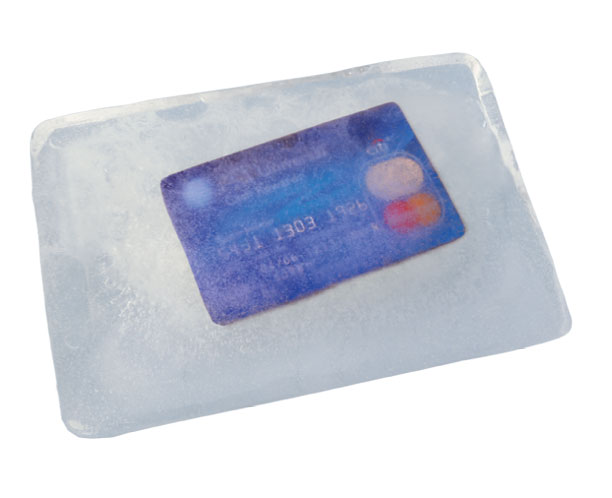I cut out inessential spending for one month. And by that, I mean: I didn’t come anywhere near cutting out inessential spending for a month.
Related: 7 Ways to Save Money by Simplifying Your Life
For the record, I tried. My assignment was simple: Eliminate all spending that wasn’t essential to the health of my family, the payment of recurring bills or the survival of the pets. No fancy coffee. No clothes. No cocktails. No movies. Nothing outside of the pure necessities of life in a hardening America. Then at the close of the experiment, I was to report all of my glittering lessons about the value of self-denial, discipline and minimalism.
Here’s what I learned: Life can get crazy, and sometimes you just want a taco.
This is not to say that a spending hiatus is a bad idea. British blogger Michelle McGagh documented this exact concept in her book The No Spend Year: How I Spent Less and Lived More, which tracked 365 days of no spending by her and her husband. As a financial advice writer, McGagh’s challenge was better organized and executed than mine. After bills, food and toiletries, she writes, “Everything else was off-limits. Which meant there’d be no more rounds of drinks purchased in the pub (tap water only from now on), no new clothes, no presents for my nephews, no takeaway coffees, no meals out and no holidays.” She got around on her bike, discovered free entertainment and allocated the money she saved largely for extra mortgage payments.
Although I might not have cut out all of my spending for a month, this exercise instilled in me, like McGagh, a sharper grasp on what money is going where and why. And I reminded myself that dedicating time and icy, emotionless attention to your budget is a wise and welcome endeavor, as long as you don’t do it so frequently that you end up abandoning joy or companionship.
Applying a magnifying glass to it all didn’t help me eliminate a new car’s worth of expenses, but it did force me to prioritize them.
Frankly, I had neither her willpower nor her dedication for eschewing an anti-consumerist lifestyle. My family has never been terribly big into gratuitous spending anyway, with exceptions made for travel and Bruce Springsteen tickets. Not to sound like a sore loser, but McGagh also had two big advantages on me: 1) She has no kids; and 2) She lives in London, where some of the world’s most awe-inspiring activities, like hanging out with a sarcophagus at the British Museum, are readily available for the reasonable price of nothing. We have two kids and no free ancient dead people in Indianapolis, so there would be some unavoidable expenses.
But if I’m being honest, it was mostly the lack of willpower that made me fail. Dedicating myself to a milkshake-free month turned out to be an exercise in brutality I was unprepared to face. It’s one thing to be mindful of your expenses; it’s entirely another to walk past La Chinita Poblana on Westfield Boulevard and not drop in for a crispy shrimp taco, just because, at 4 o’clock in the afternoon.
One could argue that my failure represents a breakdown of will, an inability to make it even 48 hours before collapsing into a heap of excuses and justifications. To that I’d say: Yeah, I know.
But there’s more to it. First, this experiment in militant miserliness came at a particularly bad time. February contained my son’s 13th birthday, the release of The Lego Batman Movie and the announcement of a summer concert that featured Def Leppard and Poison, together, ON THE SAME STAGE. I’m appropriately dedicated to my work as a writer, but I’m also a sucker for shameless, sugar-packed nostalgia-metal concerts you can see for a $25 Groupon. Also, as you may or may not know, February is the month that has Valentine’s Day in it, and that required a finer present for my wife than hair metal tickets.
Second, and more important, I found out quickly, a life without the occasional indulgence—even, if not especially, small ones—can be a dull and pointless slog. In no way am I suggesting that happiness is available only in the form of moon-sized yachts and cigars lit with rolled-up $100 bills. Some of my favorite people conjure joy with very little, and many of my most prized memories didn’t involve a single expense. McGagh writes of camping trips, handmade gifts and visits with friends that don’t have to happen in pubs.
Related: Can Money Buy Happiness?
But a life without rewards, without a moment to breathe and think, I’ll get that slice of key lime pie or I’ll put this away for summer vacation? What’s the point in that? Isn’t that ill-advised extra glass of wine one of the better parts of life?
***
I initially found the idea of a spending hiatus deeply appealing. As a family, we Vrabels have always been a frugal lot, and by frugal, I mean some of us take strawberry and grape jelly packets from diners instead of purchasing substantial jars at the grocery store. My extended family’s garages contain about 900 buckets full of water-logged golf balls fished out of ponds and mini-golf courses. And my cousin recently confessed that after nearly 15 years of marriage, it still drives him bonkers to see his wife use a piece of aluminum foil only once. “I die a little each time,” he texted, “and don’t even get me started on the plastic bags.”
So I initially thought of this as a welcome and genetically satisfying reset, an opportunity to throw the emergency brake on the family finances. (It helped that it arrived about the same time as the Christmas credit card bills.)

Besides, I thought, How bad could it be? I already had a house full of unfinished projects, unwatched shows and un-spun records. I re-evaluated old clothes. I found books I’d been meaning to revisit since college. (I am blessed with a few hoarding chromosomes.) But one night, when we settled in to figure out whatever this Stranger Things TV show was, an uncomfortable thought floated right into my field of vision: Does Netflix qualify as necessary? And then, scanning the rest of the house: Does any of this qualify as necessary? Can I eat only dry bread and cans of beans, use gasoline only to get to essential places? Is karate essential? Is school? Frankly, it was way more of an existential crisis than I was expecting. This would need rules. The rules went like this:
Inessential spending included:
- All clothes.
- Books.
- Ice cream from The Scoop downtown.
- Media, unless we could stream it with an existing subscription.
- Breakfasts and lunches out (not dinners, as our Tuesday schedule is packed with after-school events and a weekly Dad-and-boys pizza trip I consider emotionally essential).
- 100 percent of externally purchased doughnuts.
Related: 50 Ways to Relax Without Spending Money
Essential spending:
My first essential was the coffee shop. (Look, I work from home. If I sit in my house all day, I end up a patch-bearded lunatic with 6-inch fingernails who wanders the grocery store in a bathrobe. But I ordered only small black coffees, which is a fairly pathetic version of self-denial, but here we are.) Then it was a dentist appointment. And I confess that I splurged on medicine for pinkeye—the medicine was $30, which at the time seemed awfully extravagant, and I stood at the pharmacist’s counter wondering: Is this an essential expense? Can I just ride this out? Would it strengthen my white blood cells to let them combat this for free? And then I forked over $30 for the medicine, because I was tired of being a crimson-faced demon with itchy eyes.
And indeed, I found pretty quickly that the line between essential and non-essential was nebulous, constantly shifting and subject to my whims and caffeine needs. I also found how quickly I factored in things that were technically non-essential but felt pretty essential. Our Blue Apron subscription, which we use to cut back on grocery bills and shopping time, stayed in. We abandoned cable years ago, but Netflix’s Octonauts and Dragons: Race to the Edge were highly essential, according to the small children who run my house.
***
Why didn’t it occur to me to work from the public library? Well, it did, and I discounted that idea outright: I don’t work from coffee shops for the pricey coffee. I do it to be around people; and as richly valuable as libraries are, they’re not great for people-watching.
These were the kinds of minor justifications that sank me. I decided I could purchase tickets for a concert because it was in May; that I could buy this butter streusel coffee cake because technically I found it before my experiment and also because it’s delicious. Those little cracks of sunlight in the rulebook made all the subsequent ones much easier.
This, of course, is the gradual, subtle process of justification that gets people into trouble: One jacket here, one scone there, and before long every incremental expense adds up to credit card balances and dark phantoms that steal your money without you ever noticing.
Although I didn’t succeed at McGagh’s brutal version of cold turkey, I feel the experiment worked, and here’s why: It demanded vigilance. It coldly identified easily removable spending, expenses I’d become accustomed to OK’ing even when they were red-flagged in Mint, the budgeting app I use.
Like most people, I had a broad sense of how much went to four movie tickets, a record here or there, a Panera meal on the run. But that sense was less math and more a vague notion easily shoved to the back corner of my mind. And the cracks in between those merciless digits are where the overspending takes hold and flourishes.
Applying a magnifying glass to it all didn’t help me eliminate a new car’s worth of expenses, but it did force me to prioritize them. Vacation saving, for instance, was the first thing that stayed. My wife and I long ago decided that travel is a primary reason we work in the first place. If you’re not setting goals, working toward them and then enjoying the payoff when they become reality, what’s the point?
Although I might not have cut out all of my spending for a month, this exercise instilled in me, like McGagh, a sharper grasp on what money is going where and why.
And this reordering of priorities—a dull, annoying process—is the life-saving part. Fiscal vigilance taken to the extreme can make you not a lot of fun at parties and a super-annoying spouse, but determining what is essential is worth a few lousy hours.
Now I stop and think before purchases, an automatic little self-check that wasn’t there before. In 30 days—a shorter time than I’d have guessed—I installed a mental hold-up button, one that I’ve been employing ever since. I’d argue that even this entry-level awareness can pay off in the long term.
So I’m left a bit more mindful after this experience, skipping another blue-plaid shirt here and movie there to gradually hoard cash for more meaningful-to-me goals like travel, family, time not thinking about money and maybe a few tickets to see the Chicago Cubs, who raised their ticket prices 20 percent this year—inessentially.
Related: 10 Money Habits That Are Leaving You Broke
This article originally appeared in the June 2017 issue of SUCCESS magazine.









